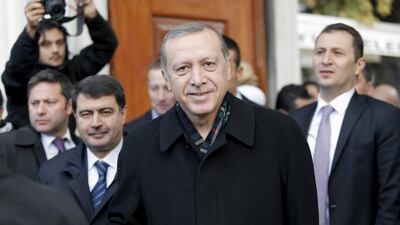What is the normal, or appropriate, reaction when a political party wins a general election? In most cases congratulations to that party’s head from other leaders is the order of the day, if only out of politeness. When that party has also been responsible for banishing the prospect of the armed forces deciding to take charge when they felt like it, thereby entrenching democracy in a country with a history of military coups roughly once a decade, one might have thought the felicitations especially fitting.
But that has hardly been the response to last weekend’s victory by Turkey’s AKP. Leading publications have warned darkly of the consequences of the vote. “Turkey, long the best hope for a Middle Eastern Muslim democracy, has not yet disappeared entirely over the authoritarian brink, but it is close,” read a New York Times op-ed, while one Guardian columnist claimed the election meant the country was “turning from democracy towards autocracy”.
Whatever one thinks about the mildly Islamist AKP and its forceful leader, Recep Tayyip Erdogan – and he in particular has many critics, both at home and abroad – these are very strange responses to an election which the AKP won handsomely.
It took 49.4 per cent of the vote, which is more than enough under any electoral system that is not one hundred per cent proportional to secure a majority in a national parliament. Canada’s new prime minister, Justin Trudeau, and his Liberal Party won their recent general election with 39.5 per cent, for instance, while Britain’s Conservatives won a majority in May on 37 per cent.
Moreover, the AKP didn’t just win. It increased its vote by three million compared to the last polls in June. If more people vote for a party already in office, doesn’t that provide extra democratic validity to its continuance in power?
Mr Erdogan was entitled to aim a little sarcasm at his critics on Monday. “Is this your understanding of democracy? Now a party with some 50 per cent in Turkey has attained power. This should be respected by the whole world, but so far I haven’t seen such maturity.”
It does appear to be yet another instance of critics – mainly western, opposed to any whiff of political Islam, firm in their conviction that a capitalist, pluralist and liberal society is the only acceptable model – attempting to delegitimise a perfectly democratic election when they don’t like the result.
The most egregious example of this was the 2006 Palestinian legislative polls. US president George W Bush urged for these elections to take place, and when they did they were praised by Edward MacMillan-Scott, head of the EU’s team of observers, as “a model for the wider Arab region”. But the Palestinians made the “wrong” choice. They voted for Hamas. This was not how democracy was supposed to work, according to the US and the EU, which punished the Palestinian people by refusing to recognise their new government and cutting off aid to it.
Similarly, the Venezuelan people’s habit of voting freely, fairly and democratically to elect the late president Hugo Chavez, a leftist, irritated Washington so much that the Bush White House sanctioned an attempted coup against him in 2002 – a fact which they tried to conceal after it failed, although not before the Bush administration demonstrated it disregard for democracy by endorsing the short-lived coup’s government.
To dislike, or even find incomprehensible, democratic choices is one thing.
The outside world may well be perplexed that Ferdinand Marcos Jr reckons he has enough support to run for the vice presidency in the Philippines. Wasn’t his father, the late president Marcos, a dictator who earned the ignominious distinction of being declared the second most corrupt leader of all time by the NGO Transparency International?
That may be so, but Filipinos have already elected “BongBong”, as he is known, a congressman, senator and governor, and if they wish to raise him to even higher office, that is their choice.
Similarly, if Donald Trump became the Republican nominee – it still seems impossible, but you never know – and won, it might raise questions about the health and depth of American public discourse, but it wouldn’t be undemocratic.
Some suggest that if people freely vote for a leader who is going to reduce the democratic space – one of the charges laid against Mr Erdogan – that is undemocratic. But the programmes of every political party can be seen as opening, reducing or maintaining that space. Do you increase the right to free speech – which would be seen as opening – or stress the importance of stability and harmony? The latter could be seen as likely to box in that arena, but if that is the people’s preference, as expressed through the ballot box, there is nothing undemocratic about it.
Railing against the results of an election is fine. The pithiest instance of such pique was provided by the American political consultant Dick Tuck who, on failing to be elected to the California state senate in 1966, declared: “The people have spoken” before using a derogatory term to describe the voting public.
Far more insidious is to insist that some votes are less democratic because they elevate politicians or parties that others find distasteful. This undermines the principle of democracy itself; and it renders hypocritical those who call for its spread, but who are then highly selective about what constitutes its acceptable practice.
Mr Erdogan may never be a hero to liberals and secularists. But it appears that the Turkish people have no desire to be led by such a man. They voted, resoundingly, for his party. That is not autocracy in action, but democracy. If some critical outsiders appear to have forgotten what the word means, he is entirely within his rights to remind them – and the sharper, the better.
Sholto Byrnes is a senior fellow at the Institute of Strategic and International Studies, Malaysia


